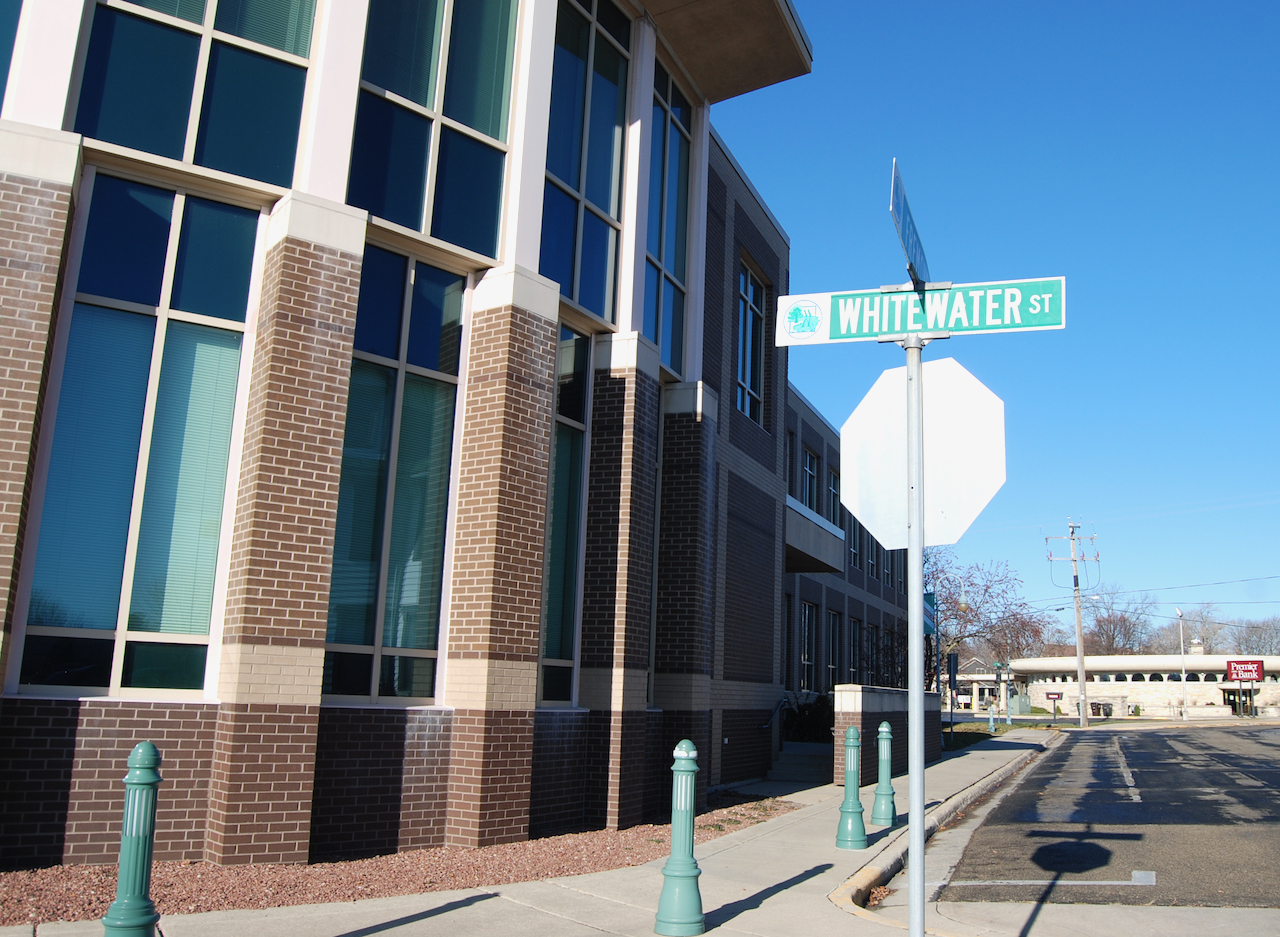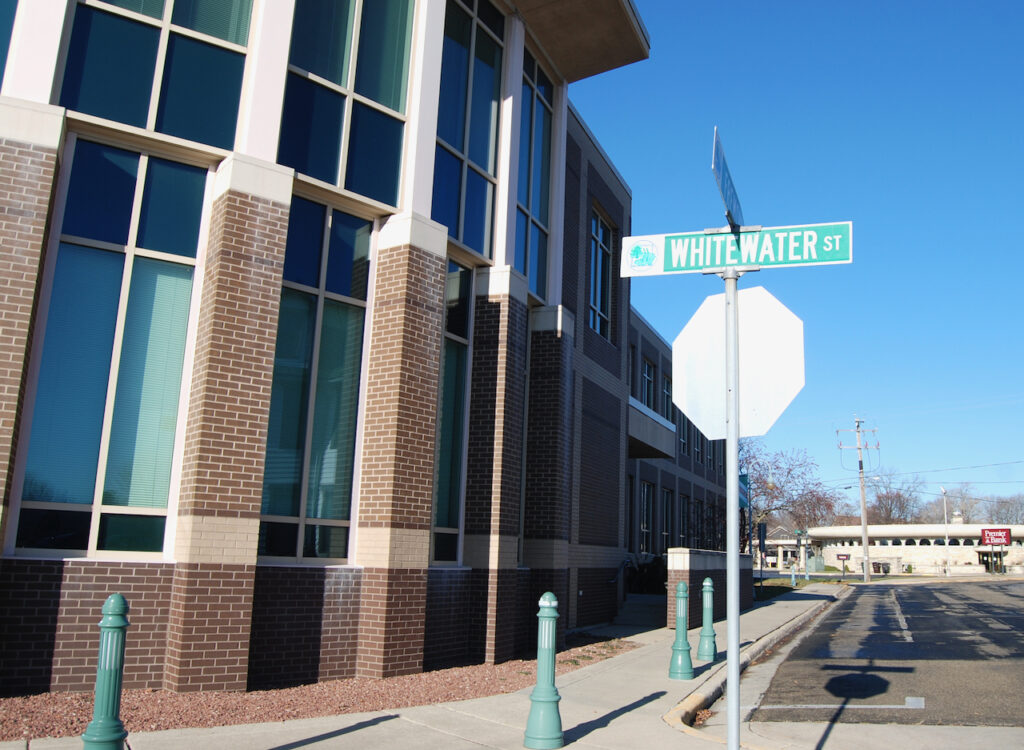By Kim McDarison
A modification approved by the Whitewater Plan and Architectural Review Commission (PARC) as part of a conditional use permit for a 128-unit apartment complex on the city’s east side has been found “not legally enforceable” and in violation of Wisconsin’s Fair Housing Law, by both the Whitewater city attorney and an attorney hired to advise members of the Whitewater Community Development Authority (CDA).
The findings were shared Friday by Whitewater City Manager John Weidl in a letter to members of the city’s common council.
Given the findings, the city manager wrote, “this matter is being referred back to the PARC, and both the city attorney and the CDA attorney will attend that meeting.”
The next PARC meeting is scheduled to take place Monday, Sept. 9.
Last month, the PARC approved a conditional use permit for Chris Slater, a developer who is proposing to build the apartment complex on some 11 acres of vacant property near the intersection of Moraine View Parkway and Jakes Way. The approval came with a condition, restricting the developer from accepting Section 8 vouchers and Section 42 housing tax credits.
The conditional use permit was required by the city to allow the developer to place buildings with more than four units on a single parcel of vacant land within the city’s R-3 zoning district.
The project calls for the development of eight buildings, each with 16 units, over the course of two phases.
The conditional use permit, with the modification, was approved by a vote of 4-3, with Plan Commission Chairman Neil Hicks, and commissioners Carol McCormick and Mike Smith voting against the measure.
Following the August meeting, Weidl said that a Wisconsin statute, known as the Wisconsin Open Housing Law, prohibits discrimination in housing based on such factors as race, color, sex, national origin, disability, familial status, marital status, sexual orientation, lawful source of income, age and ancestry.
Weidl, who did not attend last month’s PARC meeting, said that upon learning of the restriction placed on the conditional use permit, he sought an opinion from Rick Manthe, an attorney who was recently hired to advise members of the city’s CDA.
He asked Manthe to provide a legal opinion as to whether the deed restriction placed by the PARC as a condition of approving the apartment complex’s conditional use permit was in compliance with the federal fair housing laws, and if it was enforceable.
In his letter released Friday, Weidl wrote: “After reviewing relevant legal documents, it is clear that the condition imposed by PARC on the Jakes Way development was not legally enforceable to restrict Section 8 and Section 42 housing vouchers. This restriction, imposed by the PARC on Jakes Way, is not only legally indefensible but also violates Wisconsin’s Fair Housing Law (Wis. Stat. § 106.50), which explicitly prohibits discrimination based on a person’s lawful source of income. Section 8 of the Housing Act of 1937 and Section 42 of the Internal Revenue Code are designed to provide housing assistance for low-income individuals and families. Section 8 provides rental subsidies, while Section 42 involves the Low-Income Housing Tax Credit (LIHTC) program, which supports the development of affordable housing. Further, Wis. Stat. 66.10015 might apply. It provides that ‘No city, village, town or county may regulate the amount of rent or fees charged for the use of a residential rental dwelling unit.’ Arguably, the restriction on sections 8 and 42 of housing could be considered a rent control regulation prohibited by this statute.”
Weidl wrote that the “courts have consistently upheld the broad interpretation of these protections …” He cited various case law supporting that conclusion.
Further, he wrote: “Wisconsin courts have emphasized that municipalities cannot enact zoning regulations that circumvent state and federal anti-discrimination protections. As such, a condition that prevents Jakes Way from accepting Section 8 or Section 42 vouchers is not only discriminatory, but also runs counter to public policy objectives designed to promote equitable access to affordable housing.”
He continued: “Attempting to impose such restriction is not legally tenable and could expose the city to litigation.”
According to legal counsel, Weidl wrote in his memo, “the commission lacks the authority to deny an application based on conditions that are not measurable, reasonable, or grounded in substantial evidence.”
He noted that analysis provided by an attorney stated that “any condition placed on a (conditional use permit) must be based on substantial evidence and must be measurable.”
In the case of the proposed apartment complex on the city’s east side, the city manager wrote, “the applicant met all measurable requirements outlined in the city ordinance. Wisconsin law mandates that if an applicant satisfies all the requirements and conditions, the city has no discretion to deny the permit. It’s important to recognize that once the conditions of a conditional use are met, approval is required under the law.”
During the PARC’s August meeting, Kory Krieser, described by Whitewater Economic Development Director Taylor Zeinert as Slater’s “right-hand man,” said the developer would accept a modification including language that excluded the housing vouchers and tax credits as long as such language did not violate stipulations as they related to fair housing requirements.
During the meeting, City Attorney Jonathan McDonell said he believed the city could require the restriction, adding: “I think that it’s fair to have those conditions regarding Section 8, limiting potential new development, limiting them to … not have any of this federal funding as long as the city, you know, has zoned properly where they do allow Section 8, and I do believe, we do currently comply with that, so limiting that as a condition would be legal.”
In a document shared by McDonell with members of the PARC in late August, and included with Weidl’s Friday memo to members of the city council, the city attorney wrote that “Restricting a housing development from accepting Section 8 and Section 42 vouchers violates Wisconsin’s Fair Housing Law, particularly its provisions against discrimination based on lawful sources of income. Such restrictions also run counter to the state’s public policy objectives of expanding affordable housing access. Therefore, any policy or regulation that seeks to limit Section 8 or Section 42 vouchers in housing developments must be viewed as unlawful and discriminatory under Wisconsin law.”
Weidl closed his Friday memo to council, writing: “I trust this clarifies the legal situation and reinforces our obligation to follow state and federal laws as our PARC considers this application.”
The full analysis, dated Aug. 29, from Madison-based Stafford Rosenbaum, LLC, attorney Rick Manthe is here: http://whitewaterwise.com/wp-content/uploads/2024/09/Slater-CUP-Memo.pdf.
The memo to the PARC written by Whitewater City Attorney Jonathan McDonell is here: http://whitewaterwise.com/wp-content/uploads/2024/09/Memo-re-Limitations-on-Section-8-and-42-Housing.pdf.
The letter from City Manager John Weidl released Friday to members of the city council is here: http://whitewaterwise.com/wp-content/uploads/2024/09/Legal-Clarifications-on-PARC-Conditions-and-Conditional-Use-Permits-CUP-for-Jakes-Way.pdf.
An earlier story about the approval of the conditional use permit for the east side Slater development is here: https://whitewaterwise.com/plan-commission-approves-moraine-view-conditional-use-permit-modification-under-review/.
The agenda for the Sept. 9 PARC meeting is here: https://meetings.municode.com/adaHtmlDocument/index?cc=WHITEWATWI&me=38e375cc7fab46daafe7ffaf90d1fcb1&ip=False.

